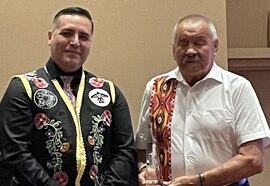Le sage Frank Ozawagosh, membre de l’Université de l’EMNO, a reçu le Prix d’excellence pour l’ensemble des réalisations de la Nation Anishinabek
Posted on February 5, 2024
Le couple Frank et Julie Ozawagosh sont des figures marquantes de l’Université de l’EMNO depuis sa création en 2005. Récemment, Frank a reçu le Prix d’excellence pour l’ensemble des réalisations décerné par la Nation Anishinabek, distinction que Julie a reçue en 2015.
Reconnus comme des sages à l’Université de l’EMNO, Frank et Julie préfèrent les termes anishinabeks « Mishomis » (grand-père) et « Nookomis » (grand-mère). Ils ont commencé à intervenir à l’Université de l’EMNO lorsque celle-ci leur a demandé de diriger une cérémonie lors de l’inauguration officielle. Peu après, ils ont accueilli des étudiantes et étudiants en médecine dans leur hutte de sudation. « Nous avons tout simplement fait partie de l’Université de l’EMNO après cela. Nous faisons partie du décor » indique Julie qui définit le couple comme les tout premier Mishomis et Nookomis de l’Université de l’EMNO.
Frank se souvient : « Au début, je ne voulais pas faire partie de l’Université de l’EMNO mais j’ai fini par changer d’avis. J’ai pensé que je pouvais jouer un petit rôle dans le changement qui se produisait, et j’ai fini par dire ‘Je serai là’. C’est une magnifique expérience depuis ».
Le prix souligne les contributions de Frank à la communauté d’Atikameksheng Anishnawbek où il fait connaître les coutumes de ses ancêtres, son temps et ses connaissances des cérémonies et des enseignements.
« C’est un honneur de voir que tout ce que j’ai fait est reconnu. J’ai fait beaucoup de choses que je voulais faire » dit-il. Un athlète passionné depuis toujours, il s’est adonné à de nombreux sports, notamment le baseball, le hockey, le bowling, la course, et s’est récemment lancé dans le golf. Il compare son fier engagement dans l’œuvre communautaire à son dévouement pour le sport.
Un projet qui lui tient à cœur est l’entretien du cimetière de la communauté : « Il y a quelques années, je suis passé en voiture devant le vieux cimetière et je ne pouvais même pas le voir. C’est là où le village se trouvait et où nos ancêtres sont enterrés. Les membres de la bande viennent dans le village mais beaucoup n’ont jamais su qu’il y avait un cimetière. Je l’entretiens depuis maintenant huit ou neuf ans. J’y vais une fois par semaine, tonds la pelouse et taille les bordures. Je suis content d’y aller car je sais que ce que nos ancêtres ont fait, ils l’ont fait pour la communauté et pour notre avenir ».
Les Ozawagosh pensent que les cérémonies et les enseignements sont un moyen important de guérir du traumatisme multigénérationnel causé par le colonialisme. Beaucoup de gens « marchent avec un traumatisme interne, ajoute Julie. Nous travaillons avec bonté et gentillesse ».
Et la bonté peut être contagieuse. Julie souligne que lorsque l’Université de l’EMNO et d’autres organismes voulaient avoir une ou un sage, Frank et elle étaient souvent mentionnés : « Le mot passe lorsque vous faites quelque chose de bien ».
Frank faisait partie des 17 citoyens anishinabeks à l’honneur à la cérémonie de remise des prix qui a eu lieu fin octobre au Casino Rama de la Première Nation des Chippewas de Rama. Il a été récompensé pour mener la bonne vie (mino bimaadiziwin).
« Lorsque le comité des prix m’a demandé de dire quelques mots, je ne savais pas quoi dire. Je suis un homme d’action et non pas un homme de paroles, explique-t-il. Je voulais le faire parce que cela faisait du bien et je savais que c’était nécessaire. »


